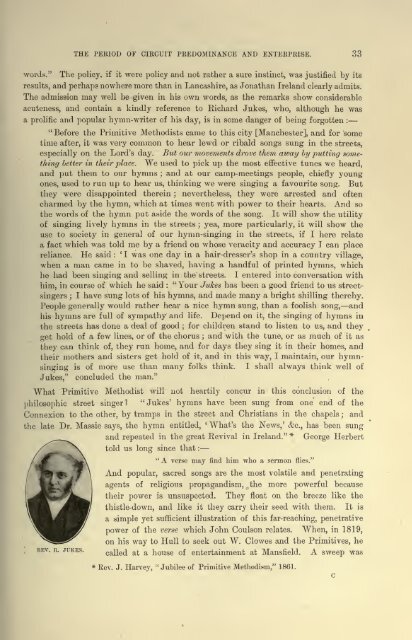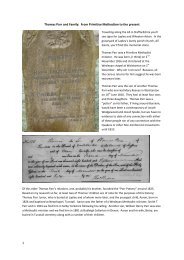Vol 2, pages 1-100 - My Primitive Methodist Ancestors
Vol 2, pages 1-100 - My Primitive Methodist Ancestors
Vol 2, pages 1-100 - My Primitive Methodist Ancestors
Create successful ePaper yourself
Turn your PDF publications into a flip-book with our unique Google optimized e-Paper software.
THE PERIOD OF CIRCUIT PREDOMINANCE AND ENTERPRISE. 33<br />
words." The policy, if it were policy and not rather a sure instinct, was justified by its<br />
results, and perhaps nowhere more than in Lancashire, as Jonathan Ireland clearly admits.<br />
The admission may well be given in his own words, as<br />
the remarks show considerable<br />
acuteness, and contain a kindly reference to Kichard Jukes, who, although he was<br />
a prolific and popular hymn-writer of his day, is in some danger of being forgotten :<br />
" Before the <strong>Primitive</strong> <strong>Methodist</strong>s came to this city [Manchester], and for some<br />
time after, it was very common to hear lewd or ribald songs sung in the streets,<br />
especially on the Lord's day. But our movements drove them away by putting something<br />
better in their place. We used to pick up the most effective tunes we heard,<br />
and put them to our hymns and at our<br />
; camp-meetings people, chiefly young<br />
ones, used to run up to hear us, thinking we were singing a favourite song. But<br />
they were disappointed therein ; nevertheless, they were arrested and often<br />
charmed by the hymn, which at times went with power to their hearts. And so<br />
the words of the hymn put aside the words of the song. It will show the utility<br />
of singing lively hymns in the streets ; yea, more particularly, it will show the<br />
use to society in general of our hymn-singing in the streets, if I here relate<br />
a fact which was told me by a friend on whose veracity and accuracy I can place<br />
reliance. He said : 'I was one day in a hair-dresser's shop in a country village,<br />
when a man came in to be shaved, having a handful of printed hymns, which<br />
he had been singing and selling in the streets. I entered into conversation with<br />
him, in course of which he said : "Your Jukes has been a good friend to us streetsingers<br />
I have<br />
; sung lots of his hymns, and made many a bright shilling thereby.<br />
People generally would rather hear a nice hymn sung, than a foolish song, and<br />
his hymns are full of sympathy and life. Depend on it, the singing of hymns in<br />
the streets has done a deal of good for children stand to listen to<br />
; us, and they<br />
get hold of a few lines, or of the chorus ;<br />
and with the tune, or as much of it as<br />
they can think of, they run home, and for days they sing it in their homes, and<br />
their mothers and sisters get hold of it, and in this way, I maintain, OUF hymnsinging<br />
is of more use than many folks think. I shall always think well of<br />
Jukes," concluded the man."<br />
What <strong>Primitive</strong> <strong>Methodist</strong> will not heartily concur in this conclusion of the<br />
philosophic street singer? "Jukes' hymns have been sung from one end of the<br />
Connexion to the other, by tramps in the street and Christians in the chapels ;<br />
and<br />
the late Dr. Massie says, the hymn entitled, ' What's the News,' &c., has been sung<br />
and repeated in the great Kevival in Ireland."* George Herbert<br />
told us long since<br />
that:<br />
"<br />
A verse may find him who a sermon flies."<br />
And popular, sacred songs are the most volatile and penetrating<br />
agents of religious propagandism, the more powerful because<br />
their power is unsuspected. They<br />
float on the breeze like the<br />
thistle-down, and like it they carry their seed with them. It is<br />
a simple yet sufficient illustration of this far-reaching, penetrative<br />
power of the verse which John Coulson relates. When, in 1819,<br />
on his way to Hull to seek out W. Clowes and the <strong>Primitive</strong>s, he<br />
called at a house of entertainment at Mansfield. A sweep was<br />
* Rev. J. Harvey, " Jubilee of <strong>Primitive</strong> Methodism," 1861.



